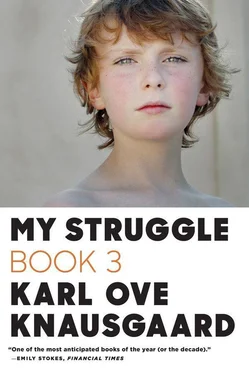She leaned forward and felt the kitten.
“I’m sorry,” she said. “But I think he’s dead.”
She looked at me and got up. I put my arms around her.
“He won’t be in any more pain,” she said.
“No,” I said.
I wasn’t crying.
“Should we bury him right away?” I said.
“It’s best to wait until Dad and Yngve come home, don’t you think?”
“Yes,” I said.
And so we did. While Mom was in bed Dad carried the kitten to a corner of the garden, followed by Yngve and me, dug a hole in the ground, put the kitten in, and shoveled earth over him. He wouldn’t hear of a cross.

There are two pictures of the kitten. In one he’s standing in front of the television with a raised paw, trying to catch a swimmer. In the other he’s lying on the sofa beside Yngve and me. He has a blue bow tie around his neck.
Who put the bow tie on?
It must have been Mom. That was the sort of thing she would do, I know that, but during the months I have been writing this, in the spate of memories about events and people who have been roused to life, she is almost completely absent, it is as if she hadn’t been there, indeed as if she were one of the false memories you have, one you have been told, not one you have experienced.
How can that be?
For if there was someone there, at the bottom of the well that is my childhood, it was her, my mother, Mom. She was the one who made all our meals and gathered us around her in the kitchen every evening. She was the one who went shopping, knitted or sewed our clothes; she was the one who repaired them when they fell apart. She was the one who supplied the bandage when we had fallen and grazed our knees; she was the one who drove me to the hospital when I broke my collarbone and to the doctor’s when I, somewhat less heroically, had scabies. She was the one who was out of her mind with worry when a young girl died from meningitis and at the same time I got a cold and a bit of a stiff neck. I was bundled straight into the car, off to Kokke-plassen, her foot flat on the accelerator, concern flashing from her eyes. She was the one who read to us, she was the one who washed our hair when we were in the bath, and she was the one who laid out our pajamas afterward. She was the one who drove us to soccer practice in the evening, the one who went to parents’ meetings and sat with other parents at our end-of-term parties and took pictures of us. She was the one who stuck the photos in our albums afterward. She was the one who baked cakes for our birthdays and cakes for Christmas and buns for Shrovetide.
All the things mothers do for their sons, she did for us. If I was ill and in bed with a temperature she was the one who came in with a cold compress and placed it on my forehead, she was the one who put the thermometer up my backside to take my temperature, she was the one who came in with water, juice, grapes, cookies, and she was the one who got up in the night and came in wearing her nightgown to see how I was.
She was always there, I know she was, but I just can’t remember it.
I have no memories of her reading to me and I can’t remember her putting a single bandage on my knees or being present at a single end-of-term event.
How can that be?
She saved me because if she hadn’t been there I would have grown up alone with Dad, and sooner or later I would have taken my life, one way or another. But she was there, Dad’s darkness had a counterbalance, I am alive and the fact that I do not live my life to the full has nothing to do with the balance of my childhood. I am alive, I have my own children, and with them I have tried to achieve only one aim: that they shouldn’t be afraid of their father.
They aren’t. I know that.
When I enter a room, they don’t cringe, they don’t look down at the floor, they don’t dart off as soon as they glimpse an opportunity, no, if they look at me, it is not a look of indifference, and if there is anyone I am happy to be ignored by it’s them. If there is anyone I am happy to be taken for granted by, it’s them. And should they have completely forgotten I was there when they turn forty themselves, I will thank them and take a bow and accept the bouquets.
Dad knew what the situation was. Lack of self-knowledge was not one of his failings. One evening at the beginning of the eighties, he said to Prestbakmo that it was Mom who had saved his children. The question is whether it was enough. The question is whether she was responsible for exposing us to him for so many years, a man we were afraid of, always, at all times. The question is whether it is enough to be a counterbalance to the darkness.
She made a decision: she stayed with him, she must have had her reasons.
The same applies to him. He also made a decision, he also stayed. Throughout the seventies and the beginning of the eighties this is the way they lived, side by side, in the house in Tybakken, with their two children, their two cars, and their two jobs. They had a life outside the house, a life in the house in the way they were to each other, and a life in the house in the way they were to us. We, as children, were like dogs in a crowd of people, only interested in other dogs or doggy things, we were never aware of what else was happening, over our heads. I had a vague sense of who Dad was outside the house, for something seeped down, even to me, but it never made any sense. He was always well turned out, I was aware of that, but not what significance it carried, only when I was older and met some of his former students could I see him in that role. A young, slim, well-dressed teacher stepping out of his Opel Ascona, walking with a determined stride up to the faculty lounge, putting down his briefcase full of papers, pouring a cup of coffee, exchanging a few words with colleagues, going to his class when the bell rang, hanging his brown cord jacket on the chair and scanning the class, who sat quietly looking at him. He had a well-groomed black beard, sparkling blue eyes, and a handsome face. The boys in the class feared him; he was strict and tolerated no nonsense. The girls in the class were in love with him because he was young, had a strong aura, and looked nothing like any of the other teachers. He liked teaching and was good at it, he held his classes in a spell when he spoke about subjects that engaged him. Obstfelder was his favorite. But he also liked Kinck and, of the contemporary writers, Bjørneboe.
He was very correct in his dealings with colleagues, but also kept his distance. The distance lay in his attire; many of the other teachers would wear smocks and jeans or the same suit for months on end. The distance lay in the impartiality he exhibited. The distance lay in his body language, his posture, his aura.
He always knew more about them than they knew about him. It was a rule in his life, which applied to everyone, even his parents and brothers. Or perhaps especially to them.
When he came home from school he went into his study and prepared the evening meetings; he was a Venstre representative on the council, as well as sitting on several committees, and at one point he was a possible Storting candidate for his party, according to him. But what he said wasn’t always true, he was notorious for manipulating the truth in the circles in which he moved, although not in his work at school or in politics, where he was proper and seemly. He was also a member of a philately club in Grimstad and showed his collection at a variety of exhibitions. In the summer he devoted himself to the garden, where he was also ambitious and a perfectionist, if such is conceivable in a garden around a house on an estate in the seventies. He had inherited his interest in everything that grew from his mother, and that was perhaps what they spoke about most: various plants, bushes, and trees and the experiences they’d had with them. Sun, soil, moisture, acidity levels. Grafting, pruning, watering. With no friends, his social intercourse took place in the staff room and the family. He visited his parents, brothers, uncles, and aunts frequently and received frequent visits from them. With them he used a tone of voice that was unfamiliar to Yngve and me, and we therefore viewed it with suspicion.
Читать дальше













